An unexpected friendship: A cross-cultural sisterhood in Sweden
How a new immigrant from Kazakhstan found friendship – and hope – among a group of women in Halmstad.
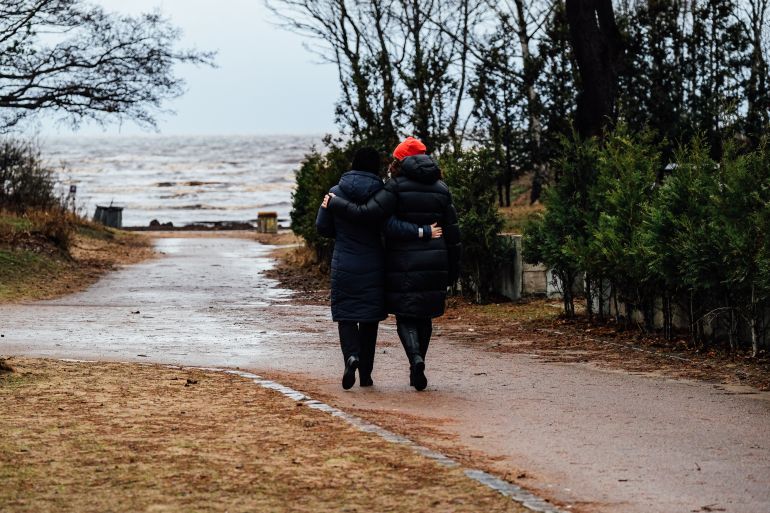
Tyvärr.
This single Swedish word, which roughly translates as “regrettably” or “too bad” and always follows bad news, encapsulated Irina Davydova’s first year trying to find work after moving to Sweden from her home country, Kazakhstan.
Keep reading
list of 4 itemsAn unexpected friendship: The gravediggers of Bucha
An unexpected friendship: A brotherly bond, from France to India
An unexpected friendship: A lighthouse across the years
Sat in the bustling canteen of a swanky co-working office complex, it is hard to believe that the polite, eloquent polyglot confidently making small-talk with the kitchen staff had lost all hope of finding a job just two years earlier.
In 2019, Irina left a high-flying job as the personal assistant to the Qatari ambassador in Kazakhstan and moved to Halmstad, a small city on the picturesque southwest coast of Sweden, to live with a Palestinian-Swedish man she had met online. The couple had married a few months earlier in her home village of Korday, 10km (6.2 miles) from Almaty, the largest city in Kazakhstan.
She had enjoyed her first few weeks in Sweden, relaxing and getting to know her in-laws, practising their Levantine dialect, which differed from the standard Arabic she had learned at university.
However, the romance of summer soon faded, and the long warm days gave way to the dark, cold and grey reality of Swedish winter. Her husband, who felt the full weight of financially supporting his whole family, would regularly work overtime, and she saw little of the “charming” and “mysterious” man she had fallen in love with.
Meanwhile, her in-laws, although they were welcoming, would often have guests over and as talk centred around relatives and friends from before their life in Sweden, Irina grew weary of the discussions.
To counter the boredom, she began to break up her weekly grocery shopping into daily outings just so she could have something to do and an opportunity to make small talk with the cashiers and supermarket staff.
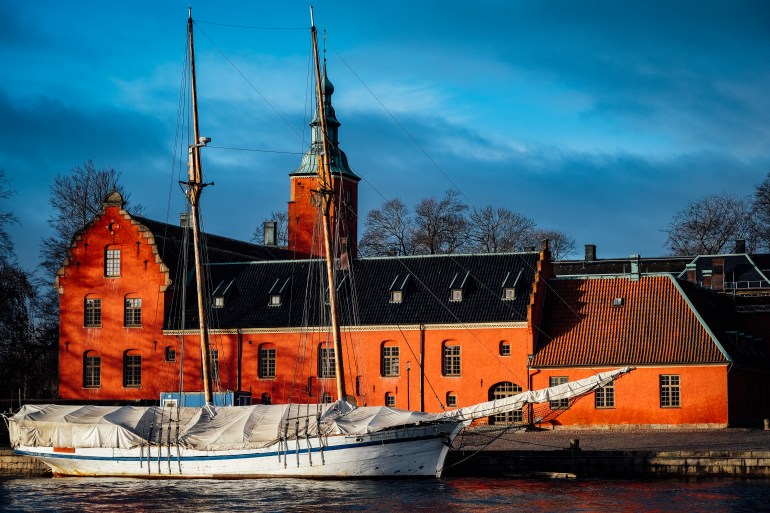
Irina, a talented linguist, already fluent in Russian, Kazakh, Arabic and English, was eager to embrace Swedish culture and was looking forward to starting “Swedish for immigrants” (SFI), a free national Swedish language course. But after waiting months to begin, the COVID-19 pandemic struck and classes were moved online, leaving Irina with no chance to meet anyone through studies.
Instead, she threw everything into getting a job, diligently filling out application forms and sending her resume to hundreds of companies for roles ranging from a cashier at the supermarket LIDL to translation bureaus, only to meet radio silence or the dreaded, “Tyvärr”.
Studies have indicated that people in Sweden with foreign names receive substantially fewer positive responses to their job applications than those with typically Swedish names.
These rejections also revealed an uncomfortable reality: Halmstad, like most of Sweden, was a deeply segregated society.
In Andersberg, the neighbourhood where Irina and her in-laws lived, most residents are of either Arab or Kurdish origin, and Irina said her attempts to speak with Swedes at the bus stop had usually ended with them simply moving away from her.
The countless job rejections and cold shoulders had left Irina jaded, withdrawn and depressed.
“With time, it became difficult to meet people, which might sound strange, but I got used to staying at home, cooking and cleaning,” she said.
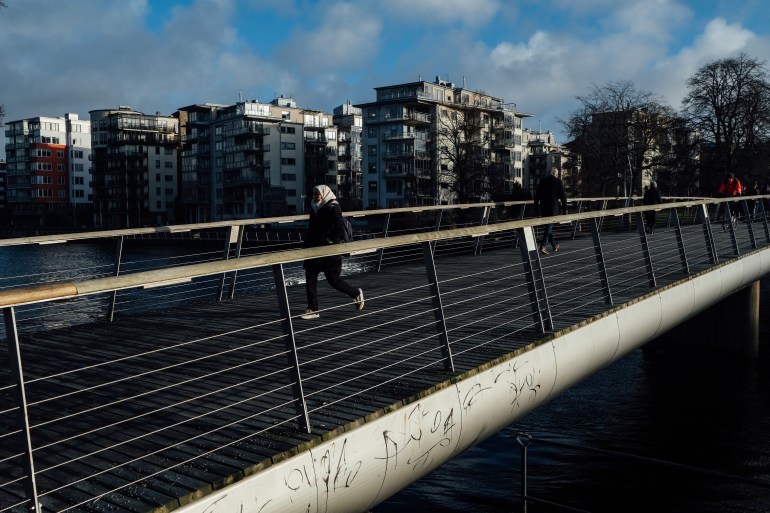
Then, in October 2020, everything changed. At a women-only networking lunch organised by WOW, a nonprofit organisation that promotes professional and social inclusion by bringing together Swedish employers with women who have migrated to Sweden and are currently seeking employment, she met Jenny Bänsch Larsson, a gregarious 52-year-old former hotelier who works for WOW, and who she now fondly refers to as her “Swedish mum”.
‘Anything for family’
Jenny laughed as she recalled her first impressions of Irina; “she was very quiet, she didn’t smile, and we didn’t connect”. She was later assigned as a mentor to help Irina find employment, but she admitted to a colleague that she could not “get a grasp of Irina’s character” as she had been so quiet and reluctant to engage in conversations.
Irina flashed a knowing smile as Jenny described their first meeting, adding that months of rejection had left her sceptical that they would be able to find her work. In fact, she had heard about the lunches through SFI eight months earlier, but had chosen not to go. In the end, a Lebanese classmate convinced her to give it a try.
She described a meeting of two women at two different points in their life. Jenny, a rambunctious woman who had secured financial security after selling a hotel she co-owned, and Irina, despondent and disillusioned after a year of rejections.
Irina recalled Jenny asking her, “What fun things do you like to do?” to which she responded, “I don’t know”.
Jenny leaned over and held Irina’s hand in hers, “But then when we spoke again, I realised she was a star, she had the best grades [from her school and university in Kazakhstan] in everything and a lovely personality.”
It was the start of a flourishing friendship that, over dozens of online meetings and Swedish “fikas” – a tradition in which people take time out of their day to make small talk over a coffee or a snack, often in the form of a cinnamon bun – would develop into an unshakeable bond.
“I will leave everything in one second if she needs me. You do anything for your family,” Jenny said firmly.
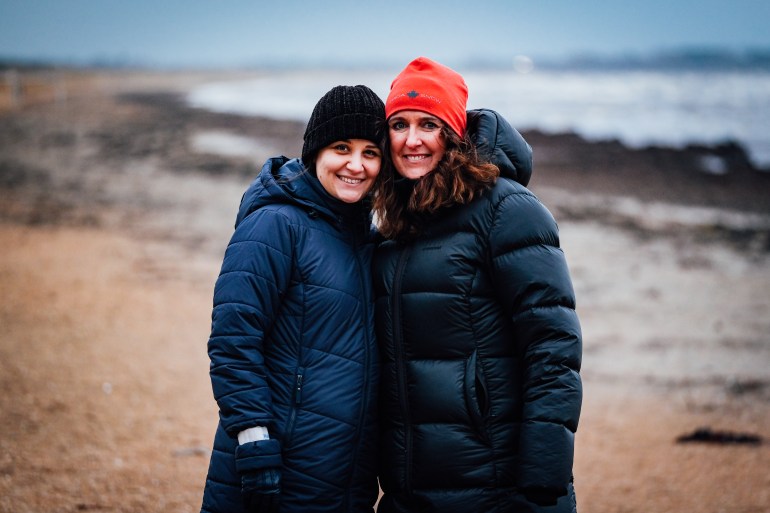
When Jenny was 21, interest rates were low and securing a loan was less difficult than it is today. Along with a couple of friends, Jenny snapped up the opportunity to buy one of Halmstad’s main hotels. Over more than 20 years, they turned the building, with its elegant red-brick gothic architecture unique to the northern European cities that lined the old Hanseatic trading route, into a thriving business. When Jenny eventually sold her share in the hotel, she was determined to throw her energy into something meaningful.
Outgoing and open to meeting people from anywhere, two characteristics which she said are not typically Swedish, she had long believed in the better integration of migrants into the workplace and says she found her calling working at WOW.
While guiding Irina through the non-profit’s seven-step programme, it dawned on her that Irina should work with them.
Until they could raise enough funds to employ her, Irina volunteered to help at their offices. “The first three months or so, I just hung out with you, did whatever you were doing,” Irina said to Jenny, “you all gave me this hope and energy. I felt like I was something again.”
‘Like food without salt’
On November 10, 2020, Irina turned 30. Her husband was working late that day and with no birthday plans, she slipped into her pyjamas and was preparing for an early night when the doorbell rang.
At the door were Jenny and several other women, carrying champagne bottles and raring to take her out on the town.
“I still remember your face; you were so surprised; no one should be at home on their 30th! So we took you out to a restaurant and had such a great time,” Jenny recalled.
In Irina’s two native languages, some expressions describe the importance of friendship; in Kazakh, you can say, “A person without a friend is like food without salt,” and in Russian, “There is no happiness without friendship”.
It is a sentiment that Irina stands by. She can clearly see in hindsight how her lack of companionship during her first year in Sweden left her bereft of confidence and happiness.
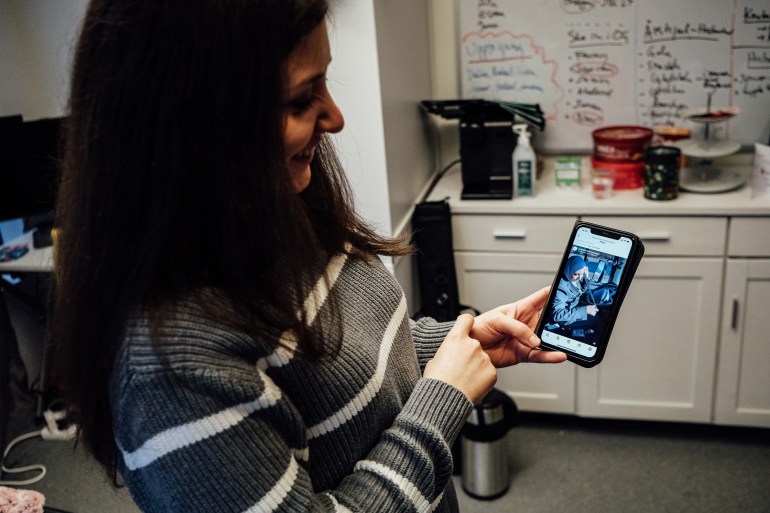
It wasn’t long before WOW had raised enough funds to employ Irina part-time. She threw herself into the work.
But it was during this time that Irina suffered a miscarriage, a deeply traumatic experience. “I was very sad, so I opened up to Jenny, and she helped me to realise this is not the end,” she said.
“It’s happened to me too,” said Jenny, “it happens to lots of women, I told her you will get through this, but of course, there were a lot of tears.”
Although the miscarriage was emotionally distressing for Irina and her husband, she says she didn’t feel he was “there when I needed him”. “This affected our relationship,” she explained with a resigned tone.
“My husband’s family were automatically by his side, but I was here alone; he was surrounded by relatives.”
Irina understood that her husband was also under an enormous amount of financial stress. “Sweden is not cheap, and when he arrived here [from Syria, where his family had moved when he was young] he couldn’t find a job correspondent to his level of education, so he took whatever he could find and had to work a lot to earn enough to support his family,” she said. Before Irina moved to Sweden, he had rented a larger, more expensive flat to accommodate her and was obliged to show the Swedish migration office that he had surplus financial funds to support Irina for her to be allowed to stay in the country.
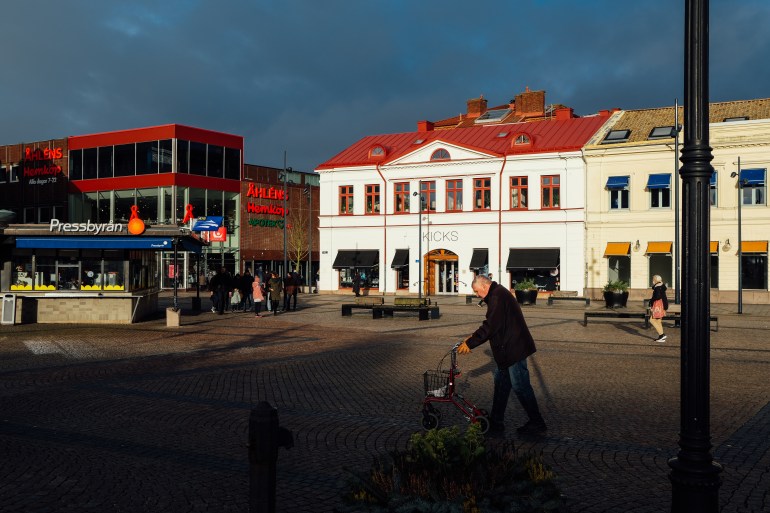
Neither Irina nor her husband had expected their new life together to be so difficult, and the relationship encountered problems. Out of respect for her husband and his family, and because Halmstad is a small city where people talk, Irina did not want to disclose further details.
But during Irina’s troubles, Jenny took her to one of Halmstad’s popular windswept sandy beaches looking out over the North Sea, and only a five-minute bike ride from her home in Andersberg.
“Can you believe I didn’t even know there was a beach near me after a whole year?” Irina asked. “I was really in a bubble.”
For Jenny, spending time with Irina was also a welcome opportunity to learn about a new culture. She highlighted the fact that Irina always tries to financially support her parents and how people in Kazakhstan happily live with and look after their older relatives as a particularly beautiful aspect of Kazakh culture. These family values are something that Jenny explains are not so prevalent in Sweden, where the state provides home nursing care for the elderly.
On the other hand, Irina has embraced the Swedish festive traditions, spending Christmas with Jenny’s family. Irina’s eyes lit up as she recalled the Julbord. This traditional seven-course Swedish Christmas feast often includes dried whitefish, ham, hot-dog-type sausages and a selection of cheeses. It was an experience that drew Irina closer to Jenny but also to Jenny’s mother, who she now refers to as her Swedish grandmother.
Jenny is unwavering in her belief that learning about each other’s cultures is essential to better integration and is the driving principle behind their networking events – which are attended by an even split of Swedish women and women of immigrant backgrounds.
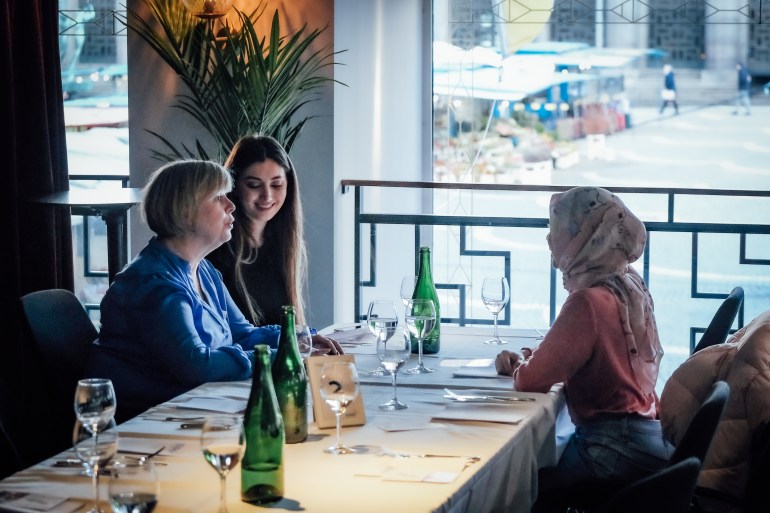
The lunches will usually focus on a subject that participants will discuss in lively breakout sessions. Irina said in these spaces, Swedes who are not used to spontaneous interactions with strangers are more “emotionally prepared” to socialise with people from different backgrounds.
“It is very important to break the barriers – you have so many examples like Irina and me – when you meet someone, then things begin to happen,” Jenny says.
A parallel society
Irina was not alone in her struggle to find work in Sweden. Jenny said that she met many women who felt rejected and disillusioned by the Swedish employment system.
“The problem is the same for everyone; we can have a woman who has fled war and only completed six years of school or a woman with two degrees from a university in Japan; it is the same struggle. How can it be that difficult in Sweden?” she said in an exasperated tone.
Irina explained that constant rejection can leave women in a spiral of self-doubt and a feeling that they are not a part of mainstream society: “I thought, what is wrong with me? I can’t give anything to this world. I am worthless. Sometimes I would lie in bed at 3am awake with no energy and no positive vibes.”
Jenny nodded in agreement. “We all need energy from someone to feel accepted; who can tell you, you can do this!”
Four months into her part-time work, an IT company headhunted Irina and offered her a part-time job. Then, in the summer of 2022, they poached her for good, offering a full-time contract. “Of course, I am so proud she has this job, but I miss her,” Jenny said as she pulled Irina in for a hug.
This article is part of a series, Unexpected Friendships, telling the stories of friendships forged in unlikely circumstances.